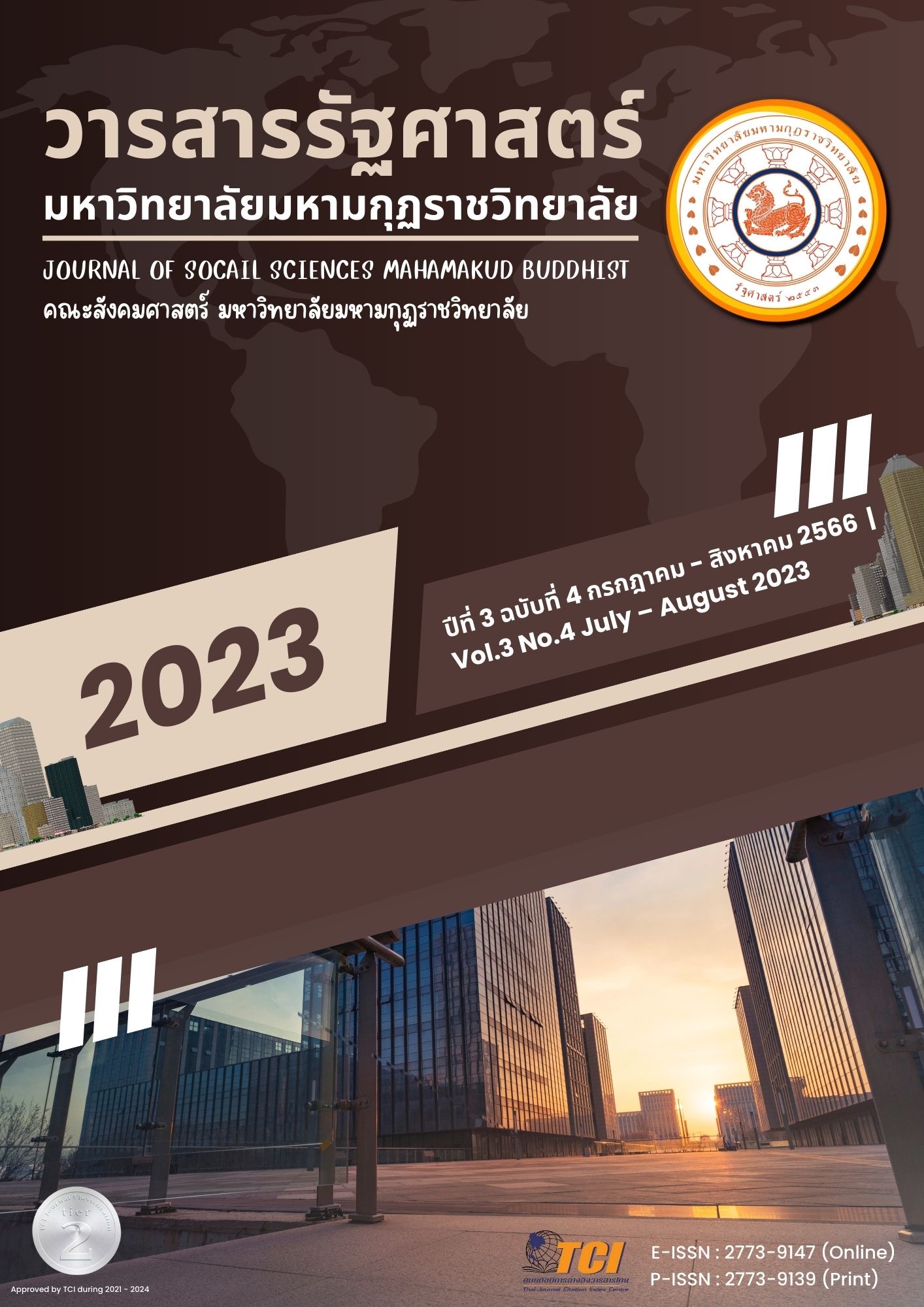POLITICAL PARTIES IN PUSHING FOR CANNABIS PLANT POLICY UNDER THE CONCEPT OF BIOECONOMY CIRCULAR ECONOMY AND GREEN ECONOMY OF THE GOVERNMENT OF GENERAL PRAYUT CHAN-O-CHA
Main Article Content
Abstract
Nowadays, cannabis plants are widely popular for their various properties, especially for medical use. It is a plant that provides both benefits. On the other hand, if used incorrectly, it can be both legal and dangerous life if you want to push for the right cannabis plant and use it in the right way, it has to be solve in the law as well.
Therefore, This academic article aims to study the liberalization of cannabis plant policy under the concept of bioeconomy. circular economy and green economy It is a study from articles and textbooks analyze and debate on the administration of the Thai government in the promotion of liberalized cannabis plants. A comparative analysis of the marijuana liberalization policy of Thailand, the United States, the United Kingdom, Canada, Germany, Israel, Uruguay, and Japan, as well as the pros and cons of the marijuana liberalization policy. Including guidelines for pushing and improving the liberalized marijuana policy in the future, it was found that from the study of the liberalized marijuana policy, the government focused on pushing marijuana as a medical plant. The main objective is to sell as raw materials to produce medicines and medical applications. cause a wave of support and awareness of the study of the cannabis plant from the public Currently, both domestically and internationally However, the implementation of a cannabis policy is complicated by the agency's implementation. This may cause consequences such as the potential of the organization. The organization must have the ability and readiness. Whether it is personnel, budget, management structure, technology, including dealing with opposition and policy cooperation.
Article Details

This work is licensed under a Creative Commons Attribution-NonCommercial-NoDerivatives 4.0 International License.
References
กรมประชาสัมพันธ์. (2565). กรมวิชาการเกษตร เดินหน้าวิจัยพัฒนากัญชา กัญชงเพื่อประโยชน์ทางการแพทย์และเชิงพาณิชย์แบบครบวงจร. เรียกใช้เมื่อ 18 กุมภาพันธ์, 2565, จาก https://www.prd.go.th/th/content/category/detail/id/33/iid/124669?fbclid=IwAR3MLpTayQHsI10hwz2JDNztmJ8uWYKVLIRKM6Y8IHPVMGvZknc1f8TdQPM.
คณะอนุกรรมการขับเคลื่อนภารกิจของคณะกรรมการนโยบายสมุนไพรแห่งชาติ. (2562). การพัฒนาสมุนไพรภายใต้กรอบการพัฒนาวิทยาศาสตร์ เทคโนโลยีของประเทศไทยเพื่อเศรษฐกิจชีวภาพ เศรษฐกิจหมุนเวียนและเศรษฐกิจสีเขียว. เรียกใช้เมื่อ 18 กุมภาพันธ์ 2565 จาก https://www.dtam.moph.go.th/index.php/th/download/4326dl0058.
เจณิตตา จันทวงษา. (2565). คุมกัญชาเสรีอย่างไรให้ปลอดภัยกับเด็กและเยาวชนที่สุด.เรียกใช้เมื่อ 18 กุมภาพันธ์ 2565 จากhttps://www.the101.world/cannabis-legalization-and-youth/
ฉัฐวัฒน์ ชัชณญาภัฏฐ์. (2565). การส่งเสริมนโยบายกัญชาในสังคมไทย. วารสารสังคมศาสตร์และมนุษยศาสตร์, 47(1), 171-186.
ดวงหทัยชนก เรืองหนองยาง. (2561). การประยุกต์ใช้แนวทางการบริหารจัดการภาครัฐแนวใหม่ในการจัดการระบบสาธารณสุขของประเทศไทย. วารสารศิลปการจัดการ, 2(3), 169 -177.
นารา หนูแดง. (2565). แนวทางการพัฒนานโยบายส่งเสริมให้กัญชาเป็นพืชเศรษฐกิจของประเทศ ไทย. วารสารรัฐศาสตร์พิจาร, 7(1) 16-26.
พัฒณปกรณ์ ดอนตุ้มไพร และคณะ. (2564). นโยบายกัญชาเสรีในฐานะพืชทางการแพทย์วารสาร Journal of Roi Kaensarn Academi, 6(1), 185-197.
รวิสสาข์ สุชาโต และคณะ. (2564). ผลกระทบทางเศรษฐกิจของการเพาะปลูกกัญชาเพื่อเป็นพืชเศรษฐกิจของไทย. รายงานการวิจัย. สำนักงานคณะกรรมการส่งเสริมวิทยาศาสตร์ วิจัยและนวัตกรรม.
วีรยา ถาอุปชิต และนุศราพร เกษสมบูรณ์. (2562). นโยบายกัญชา: การวิเคราะห์เปรียบเทียบไทย สหรัฐอเมริกา แคนนาดา เยอรมัน และอิสราเอล. วารสารเภสัชกรรมไทย, 13(1), 6-15.
สถาบันการแพทย์แผนไทย. (2564). โครงการที่ได้รับอนุมัติตามแผนการบริหารงบแผนปฏิบัติราชการกรมการแพทย์แผนไทยฯ ประจำปีงบประมาณ 2564. เรียกใช้เมื่อ 18 กุมภาพันธ์ 2565 จาก https://www.dtam.moph.go.th/index.php/th/download/6539-dl0106.html
สุภีร์ สมอนา. (2565). รูปแบบของอำนาจในกัญชา : ศึกษาจากวาทกรรมกัญชา-กัญชาเสรี.วารสารวิชาการมหาวิทยาลัยราชภัฎอุดรธานี, 10(2), 146-156.
สำนักงานพัฒนาวิทยาศาสตร์และเทคโนโลยีแห่งชาติ (สวทช.). (2563). BCG Economy Model คืออะไร. เรียกใช้เมื่อ 18กุมภาพันธ์ 2565 จาก https://www.nstda.or.th/home/knowledge_post/what-is-bcg-economy-model/.
อัญมณี สัจจาสัย. (2564). ปลดล็อกกัญชา ออกจากยาเสพติด. เรียกใช้เมื่อ 18 กุมภาพันธ์ 2565 จาก https://www.parliament.go.th/ewtadmin/ewt/elaw_parcy/ewt_dl_link .php?nid=2792.


